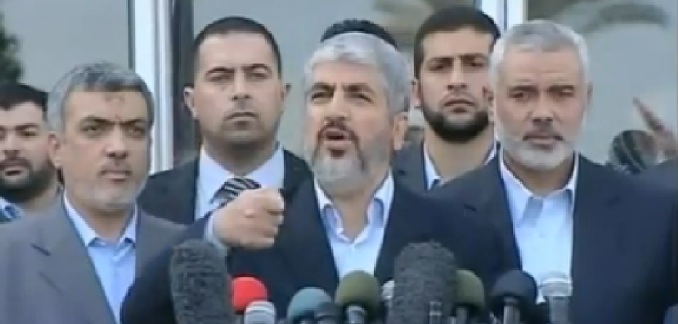Hamas appears to be stopping short of employing its full force to stop Gaza-based jihadists from launching rockets at Israel, though it has the power to do so. The Iran-backed group knows that clamping down too hard would provoke anger from the Gazan public. Hamas security forces detained a number of people from the Gaza Strip’s Salafist groups after rockets were launched at the Israeli town of Sderot during Obama’s visit. Those arrests, however, appear to have left only a partial impression.
Nonetheless Hamas is likely to soon find itself in yet another confrontation with Israel unless it shows greater determination to rein in rocket fire. Some Israeli officials believe the Qassam fire during Obama’s visit received Hamas’s tacit approval. Ultimately Hamas won’t give Gaza’s other armed groups much room to maneuver, for this and other reasons.
This week’s reelection of Khaled Mashaal to head the Hamas politburo will likely accelerate the group’s “institutionalization.” Mashaal is stationed abroad, outside of the Gaza Strip. His election doesn’t mean moderation – Mashaal is no lover of Israel and doesn’t believe in a peace process. And yet Abu Al-Walid, as he’s known, is widely viewed as one of Hamas’s more pragmatic leaders.
For Mashaal the necessity of continuing Hamas’s holy war against Israel extends only insofar as it serves the organization’s interest. Mashaal’s reelection – his fourth straight – is unlikely to engender a dramatic change in the group’s position toward Israel. It might lead to closer ties with Fatah, and perhaps even long-sought reconciliation between the two factions, though disagreements over how to approach the rival Palestinian faction still divides Hamas.
Those disagreements came to the forefront in November 2011, when Mashaal signed the so-called Doha Agreement to create a unity government with Fatah. That pact, however, met with opposition from the Hamas leadership in Gaza, which refused to continue playing second fiddle to Mashaal and the other Hamas leaders abroad.
Ismail Haniyeh, Hamas’s Gaza-based prime minister, as well as its former foreign minister Mahmoud al-Zahar, made rare public pronouncements against the exiled leadership. They insisted they did not intend to honor the agreement.
The following month, at a summit in Khartoum, Mashaal announced he had no plans to run for reelection as politburo chief. A number of Israeli and Egyptian officials smelled a PR stunt – a transparent attempt to raise public support for his candidacy. But Mashaal stood his ground until November of last year.
The announcement came immediately after Israel’s Operation Pillar of Defense.
While Haniyeh, Zahar, and company took cover in the bunkers of Gaza, Mashaal was able – through Egyptian mediation – to produce a ceasefire with Israel seen among Palestinians as a victory for the group. The agreement, and Mashaal’s subsequent visit to the Gaza Strip, brought hundreds of thousands of Palestinians into the streets. The spectacle reminded Haniyeh and his allies that Mashaal remains at the top of Hamas.
Two other reasons should be noted for Mashaal’s reelection: Qatar and Egypt. The Qatari government, Egyptian intelligence, and Cairo’s Muslim Brotherhood all supported his candidacy. To them, Mashaal is someone with whom they can do business, whether that business involves cementing a ceasefire with Israel or pursuing reconciliation with Fatah. Egyptian sources say Mashaal was unanimously chosen for the job after Haniyeh and top Hamas official Moussa Abu Marzook withdrew their own candidacies.
In return Haniyeh received the title “deputy head of the Hamas politburo in Gaza,” while ultimate authority remained with Mashaal. According to one report, Zahar – who has become a veritable persona non grata in Cairo due to his support for Iran and against reconciliation – has been left out of the political bureau entirely.
It remains unclear whether Mashaal genuinely plans to pursue reconciliation. Haniyeh may have given up on his own candidacy once he understood that creating a unity government with Fatah was an unrealistic prospect. Another possibility is that Mashaal, who was born in the village of Silwad near Ramallah, intends to do whatever possible to bolster Hamas infrastructure in the West Bank militarily and otherwise.
Gaza is already in Hamas’s hands, while the PA and Israel work feverishly to weaken the organization in the West Bank. Recent weeks have seen Hamas attempt to conduct terror attacks in the West Bank, but thus far thankfully without success. Abu Al-Walid seems far from giving up.
[Photo: EliyaaNewsAgency / YouTube]




